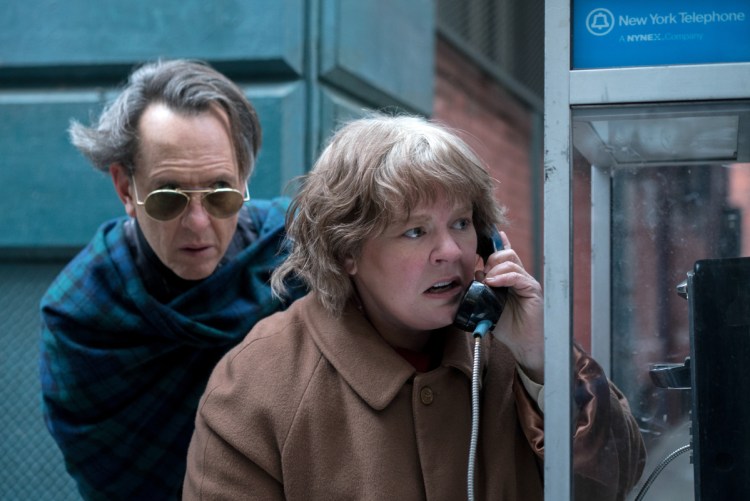Lee Israel was a New Yorker, tough, flinty and cold like the L line to Brooklyn, the wind that blows though Shubert Alley, and the unforgiving streets.
Lee, a sad drunk, was a free lance penner, not a major talent like Hemingway or Cheever; I don’t think she would have the patience to write a novel.
She took the easier route of writing biographies instead: Tallulah Bankhead, journalist Dorothy Kilgallen, and the queen of eye shadow and scents, Estée Lauder. Some of those even got her on the New York Times best seller list.
But the reading public is famously fickle, interest faded, and Lee was dropped down to living just off the curb. She huddled in a cheap walk up where she lived with a cat who used her bed, already a nest for bugs and flies, for a toilet.
Broke and despondent, she was reduced to stealing warmer coats from cloak rooms at the parties of her patient literary agent (the happy return of SNL’s Jane Curtin.)
With her cash draw full of cobwebs, Lee turned to a life of crime. Too old and fat and too slow to mug sailors or hold up bodegas, she discovered the gentle art of forgery.
There was a market in the ’70s and ’80s or personal letters from Edna Ferber, Dorothy Parker, Lillian Hellman, Noël Coward and others. So forgeries were common.
With few risks and lots of profit, Lee tried her hand. She built up a collection of antique typewriters that were used by her subjects, and spent cold winter days studying the habits of the literary lions and writing splendid forgeries. Life improved dramatically.
But as it says somewhere in the Bible, all good things come to an end. And so it did for Lee. Summarizing her criminal career, she wrote a general public apology — “Can You Ever Forgive Me?” It did well, and caught the eye of young director Marielle Heller, TV and film writers Nicole Holofcener (”Orange is the New Black” “Lovely and Amazing” ) and Jeff Whitty.
So the trio gave a dark soul part to a chirpy comedian and, guess what? It worked.
Chopping off her hair, avoiding makeup, wearing a wardrobe she seems to have stolen from a corpse in a dumpster, Melissa McCarthy hid her famous comedy instincts, and worked her way through every one of the felonious foibles in Lee’s life.
The really big surprise of “Can You” is the British actor Richard E. Grant (Simon Bricker, the cad who tried to steal away Lady Mary on “Downton Abbey”) in the juicy role of Jack Hock, a leach, drunk, drug addict and homosexual street pedophile who steals scenes from McCarthy with both hands.
Jack slithers in for warmth. She resists, but shunned by what few friends she had, she needed someone other than her cat to talk to. Jack moves in, cooks and cleans and aids Lee in her pursuit of the illegal buck. His final scenes are heart breakers.
But when fate, with its well-known fickle finger steps in and collectors get wise, the FBI comes knocking.
All the chickens, always left ignored, come home to roost, and Lee winds up in court where McCarthy has her best scenes.
Heller’s list of credits so far are slim (”Diary of a Teenage Girl”) and this piece, nicely done, even though practically written all out for her by Israel’s own telling, may give her a boost. Cinematographer Brandon Trost blessedly loves his Manhattan, and by the look of it, much of Lee’s old haunts still exist. Trost found the rot and slush, the dim bars and treated them with love and care.
Yes, McCarthy was the right choice. She’s cuter and younger than the real Lee, but in all, she succeeds. It’s award time. Watch for Grant to get one.
J.P. Devine, of Waterville, is a former stage and film actor.
Copy the Story LinkSend questions/comments to the editors.






Success. Please wait for the page to reload. If the page does not reload within 5 seconds, please refresh the page.
Enter your email and password to access comments.
Hi, to comment on stories you must . This profile is in addition to your subscription and website login.
Already have a commenting profile? .
Invalid username/password.
Please check your email to confirm and complete your registration.
Only subscribers are eligible to post comments. Please subscribe or login first for digital access. Here’s why.
Use the form below to reset your password. When you've submitted your account email, we will send an email with a reset code.